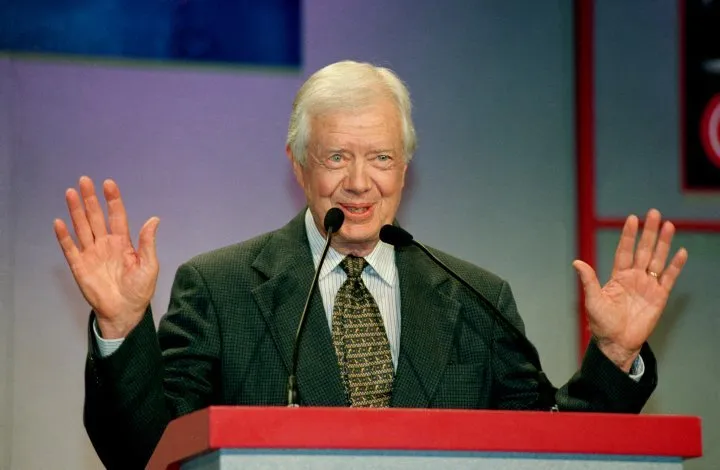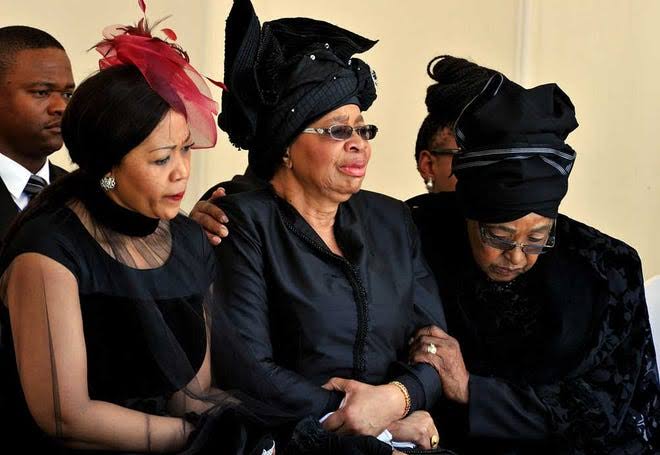Jimmy Carter, the 39th president of the United States, who died on Sunday at the age of 100, was known for his humility, commitment to peace, and extensive humanitarian work. Carter’s death marks the end of a remarkable life of service to his country and the world.
Early Life
Born on 1st October 1924 in Plains, Georgia, James Earl Carter Jr. grew up on his father’s farm. After graduating from the United States Naval Academy in 1946, Carter embarked on a successful naval career, serving in various capacities, including being a submariner. He later studied nuclear physics under Admiral Hyman Rickover, earning him a reputation for his intellect and discipline. Carter left the Navy in 1953 following the death of his father, to take over his family’s peanut farm business in Georgia.
Join our WhatsApp ChannelMarriage and Family
In 1946, shortly after graduating from the Naval Academy, Carter married Rosalynn Smith, his childhood friend. The couple had four children: John William (Jack), James Earl III (Chip), Donnel Jeffrey (Jeff), and Amy Lynn. His wife Rosalynn, who shared Carter’s commitment to public service, became a prominent figure in her own right, working alongside him on many of his initiatives throughout their marriage.
Political Career
Carter’s political career began in the 1960s. In 1962, he was elected to the Georgia State Senate, where he served until 1966. After an unsuccessful bid for governor in 1966, he ran again in 1970, successfully winning the governor’s seat in a campaign focused on racial integration, education reform, and improving the state’s economy. As governor, he introduced policies aimed at reducing racial discrimination, improving education, and expanding public health services.
Carter’s efforts to reduce racial segregation, improve educational access, and foster environmental conservation laid the groundwork for his national political rise.
Carter, a Democrat, won the 1976 presidential election by promising to restore honesty and integrity to the White House in the wake of the Watergate scandal by defeating incumbent Gerald Ford.
He assumed office during a time of significant domestic challenges, including high inflation, energy shortages, and unemployment, as well as rising international tensions.
One of Carter’s most significant achievements was the Camp David Accords in 1978, where he successfully brokered peace between Egypt and Israel, earning him global praise and, eventually, the Nobel Peace Prize in 2002.

He also focused on energy policy, creating the Department of Energy and championing efforts to reduce America’s dependence on foreign oil.
Domestically, Carter signed important environmental legislation, including the creation of the Department of Education and major energy conservation measures.
However, his presidency was marred by the Iran Hostage Crisis, in which 52 American diplomats and citizens were held hostage for 444 days by Iranian militants. Economic struggles, particularly high inflation and unemployment, also led to his defeat in the 1980 election by Ronald Reagan. He left office in January 1981.
Post-Presidency
After leaving office, Carter dedicated his life to humanitarian work. In 1982, alongside his wife, he founded The Carter Centre, a non-profit organisation focused on advancing human rights, public health, and peace worldwide. The Center has helped reduce diseases like Guinea worm disease and supported free and fair elections in dozens of countries.
Carter’s post-presidential diplomacy earned him widespread respect. His efforts to mediate conflicts in places like Haiti, Bosnia, and the Sudan, as well as his unwavering stance on nuclear disarmament, further solidified his legacy as a global statesman. In 2002, he was awarded the Nobel Peace Prize for his work in conflict resolution and human rights.
Carter also continued his advocacy for public health, focusing on eradicating preventable diseases and improving access to healthcare for the world’s poorest populations. His work with Habitat for Humanity, an organisation that builds homes for low-income families, remains a cornerstone of his post-presidential activities.
Carter was not only known for his political accomplishments but also for his integrity and dedication to service. He wrote numerous books, remained active in public life well into his 90s, and continued to give lectures and speeches promoting peace and justice.
Carter’s passing at age 100 marks the end of an era in American politics, leaving behind a legacy of peace, diplomacy, and humanitarian work that has touched millions around the world. His influence will continue to inspire future generations to work toward a more just and peaceful world
















Follow Us